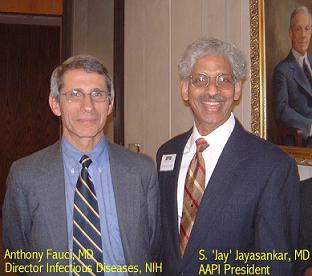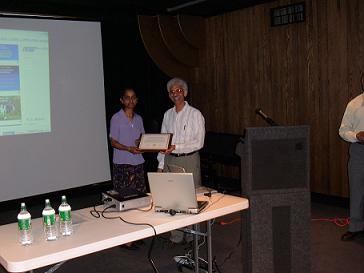Contribute
| Dr. Jayasankar - Diabetes Can Be Prevented |
07/13/2005
“Silent Killers- Diabetes and Heart Disease: Reversing the Indian curse†was the title of Dr. Jayasankar’s talk to the India Association of New Hampshire. “Silent†said Dr. Jay, “only if we do not listen. Killers, only if we let them! We can reverse this curse by taking control- learning and practicing wellness and prevention.†Prithvi Kumar, the President of the Indian Association of New Hampshire, was keen on the members having an opportunity to learn more about this life and health issue and invited him for this special program.
The Diabetes Prevention Program results published in the New England Journal of Medicine in 2002 involved over 3,000 people at high risk for developing diabetes. One group received instruction on diet and exercise along with a placebo (“sugar pillâ€), another the same instruction and a diabetes treatment pill (Metformin) that helps insulin work better and a third group received no medication but only an intensive lifestyle intervention to lose 7% of body weight and exercise 30 minutes 5 times a week. The last group was more successful than even the group that used diabetes medication in reducing the chance of developing diabetes.
“What more evidence can I give you to convince you that we Indians who are well documented in studies to have very low level of exercise need to change our life style?†he asked. “If that doesn’t convince you, the bean counters who never let down the bottom line should. The Detroit Free Press said recently, ‘Smoke, eat, sit on the sofa. You'll probably keep your job, but you're likely to pay more for your health insurance.’ And the Boston Globe reported that Boston City Councilors hope to improve the city’s fiscal fitness by adding health incentive programs. Nearly 1 out of 10 dollars spent on health care in the US is on care related to diabetes, its precursors and complications!â€
He discussed the reasons for the health disparities in the Indian American community, which includes our culture of wellness beliefs and disease behavior. In a study in UK, South Asian women who were over weight thought that they were of normal weight while European women of normal weight thought that they were over weight. We seem to be slow to seek professional help and studies indicate that often compliance with recommended prevention or treatment is not very good.
Adult Hispanics in the US have a diabetes prevalence of about 12% among adults and based on that the CDC (Centers for Disease Control) predicts that one out of two Hispanics born in the US in the year 2000 will have diabetes. In UK, studies show a prevalence of 23% in South Asian adults (age 25 and over). If we use that figure, the lifetime risk of suffering from diabetes for a South Asian born today would be near certainly. Research is on going on the prevalence of diabetes among Indian Americans thanks to funding that the AAPI obtained from the CDC and from private sources under efforts initiated by Dr. Jay while serving as President of the AAPI. The centers of that research include the Mayo Clinic, University of Texas, Arizona Heart Institute and Texas A&M.
“At what age does this increased risk for diabetes start amongst us?,†asks Dr. Jay. “8 to 11 year old South Asian children studied in UK showed that they had already by that age higher risk predictors such as poor use of insulin by the body (a precursor of diabetes), higher heart rate and blood pressure. They were lower in weight than whites, but their pounds counted more towards these risk factors. We need to train our children young!â€
Studies show that the traditional guidelines used to measure risk for diabetes and heart disease are not suitable for us and more stringent thresholds or trigger points need to be set for South Asians, whether it be for body weight or waist circumference.
“Each of us has a personal responsibility to ourselves and out family and communities, to learn and follow healthy lifestyles and to spread the message as well as inform our health care professionals about our higher risk and he need to use lower thresholds for screening and treatment. It is not so much as easy or difficult, but one of understanding and determination to achieve good and positive healthâ€
There was enthusiastic audience participation with very practical questions on how to implement these including healthy food habits. Dr. Rajni Aneja, Family Practice Physician from Southern NH Medical Center and Dr. Jayasankar answered questions about preventive measures as well as appropriate interventions.
Mrs. Thilak Radhakrishnan, IANH Education Committee Chair presented a plaque in appreciation of Dr. Jayasankar’s service to NH Indian American community. Dr. Tej Dhakar, IANH Secretary concluded the meeting with a vote of thanks. IANH distributed the Nutrition Guide prepared by AAPI to those who were present.
You may also access this article through our web-site http://www.lokvani.com/

